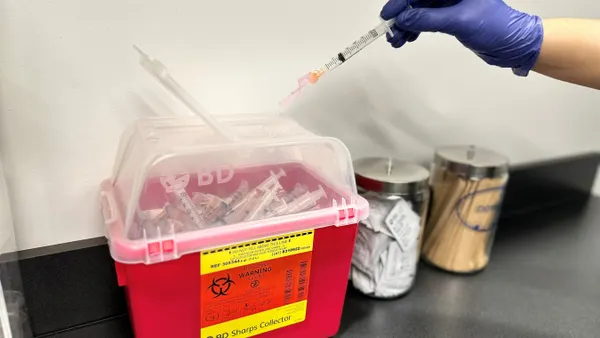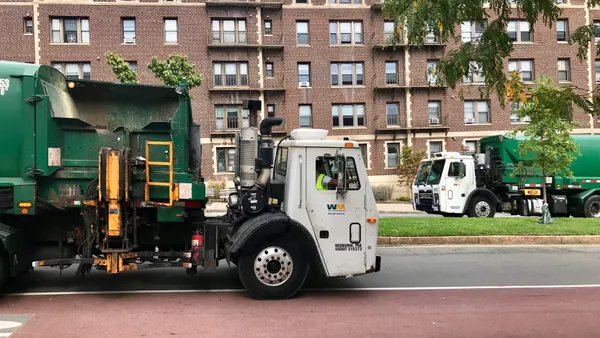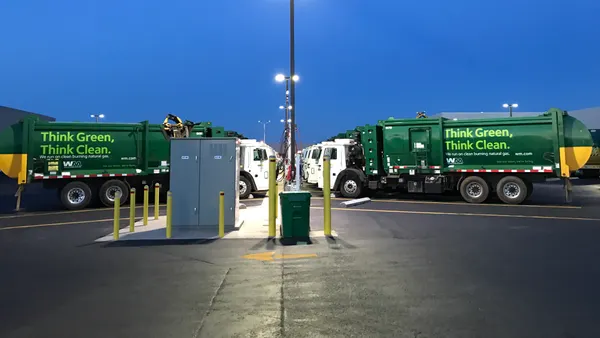2017 Earnings
| Revenue | $14.5B |
| YoY Change | 6.4%▲ |
| Acquisitions | $200M |
| CapEx | $1.41B |
Q4 Earnings
| Revenue | $3.65B |
| YoY Change | 5.5%▲ |
| YoY Recycling Revenue | $25M▼ |
Dive Brief:
- Waste Management's 2017 earnings report shows that business is good, but recycling remains unpredictable after a 24% decrease in commodity prices during the fourth quarter. That trend is projected to continue or worsen through Q1. CEO Jim Fish said the company would be going "to battle against contamination" and also hinted at a "fully robotic sort line" in development that could enter production "in the next few years."
- Executives said they are still assessing how to allocate new funds freed up by the tax cut. When asked about the $65 million worth of employee bonuses, Fish confirmed prior analysis that it's about reducing turnover among drivers and mechanics. About 50% leave within the first two years, at an estimated cost of $12,000 each. If bonuses mitigate some of those costs, Fish said "that ends up being just gravy for us."
- COO Jim Trevathan and Senior Vice President of Northern Tier Operations Jeff Harris will be retiring at the end of the year. "My decision regarding the timing is based solely on two beliefs. First, the future leadership is in place and will succeed. Second, after 39 years with the company, it's time to move to spend more time with my wonderful wife of almost 46 years," said Trevathan.
Dive Insight:
2017 was "arguably the best year we've seen" according to Fish. This was driven by organic price and volume growth, with support from disaster-related debris and new contracts in Los Angeles and New York. The company also saw a $530 million net positive impact due to the tax cut based on deferred liabilities and repatriation costs for Canadian earnings.
Going forward, Waste Management expects to see its cash taxes reduced by about $275 million this year. While this was recognized as uncharted territory, initial plans indicate more spending for employees and technology to reduce customer churn. Waste Management has budgeted up to $200 million for acquisitions, though said that could change for the right deal, and will be spending up to $1.7 billion for capital expenditures.
On the topic of employee retention, Fish and his team kept plans open-ended beyond waiting to see how the $2,000 bonuses work out at the end of 2018. The need to rethink hiring among millennials was reiterated and Fish said "we will continue to analyze the impact of turnover on our operations and our financials to be able to evaluate the merits of a retention program beyond 2018."
Executives also described the future of recycling as difficult to predict. Overall recycling revenue was solid for 2017, but volumes were down nearly 3% in the fourth quarter. An estimated $100 million in revenue headwind has been projected for 2018 based on current conditions.
The company expects China's 0.5% contamination standard will be "strictly enforced" and is hoping that OCC demand will increase by the back half of the year. In the meantime, the company will be continuing to utilize tighter contract standards and "aggressively ramping up" residential education efforts.
During Waste Management's recent sustainability forum in Phoenix, Fish talked about plans for a "moonshot" to change the recycling industry.
For now, full details about Waste Management's financial commitment to this moonshot concept are unknown. As Fish noted when asked by an analyst about financial uncertainties, recycling is but one small piece of a bigger business model.
"...On a revenue basis, recycling is still 10% or less of our overall revenue base. So, the only thing that causes me to say, okay, this one could impact us would be recycling," he said. "The rest of our guidance, including our traditional solid waste, looks very, very strong right now."












